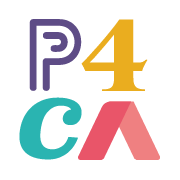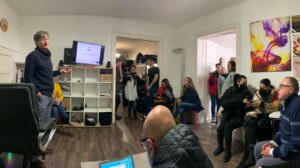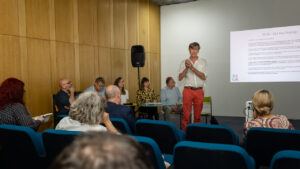 Rinova’s “Partnership for Creative Apprenticeships” (P4CA) has been awarded ‘Good Practice’ exemplar status by the UK Erasmus+ National Agency. We are delighted that this is our third project to receive this accolade in the past three years – only a small selection of completed projects are accorded this status each year.
Rinova’s “Partnership for Creative Apprenticeships” (P4CA) has been awarded ‘Good Practice’ exemplar status by the UK Erasmus+ National Agency. We are delighted that this is our third project to receive this accolade in the past three years – only a small selection of completed projects are accorded this status each year.
The National Agency scored it very highly – at 85/100 – and observed the “high quality learning outcomes for the participants” and the “detailed and well-presented results”. The assessment especially commended “the partnership working and the mechanisms for communication and co-ordination”.
This was indeed one of the biggest challenges for Rinova as lead partner and for the partner organisations – and for the wider Creative and Cultural Industries (CCIs). A few months after Rinova hosted the first kick-off meeting in Malaga in November 2019, the pandemic lock-down took hold. For two years we were unable to meet physically as a partnership. Planned activities and training in the workplace could not take place and whole swathes of artistic and cultural provision simply shut down.

P4CA Blended Mobility in Pecs, Hungary – Jan 2022
It is a tribute to the resilience and adaptability of all the partners that, despite the turbulent events of the pandemic and Brexit, the project successfully met its original aims of building the skills of apprenticeship coaches and In-House Company trainers.
During the Covid crisis, P4CA became a valuable testing ground for new levels of sustained digital transnational collaboration. What we learnt on this and other projects now informs innovations in Rinova’s post-pandemic training and development practices as we now operate through Rinova Malaga in European programmes, and which have also recently been cited as a European benchmark for the Erasmus+ programme.
P4CA took as its model the European Framework for Quality and Effective Apprenticeships, and addressed how this is delivered specifically in the CCIs in 6 different countries – UK, Poland, Hungary, Italy, Slovakia and North Macedonia. We recognised from the start that the Framework was not well known in the sector and initial research into the very different contexts in the six countries confirmed some commonalities: that the sector faces specific challenges in implementing apprenticeships and opening access for young people to creative careers, due to factors such as reliance on networks of “who you know” and structural issues such as the very high number of freelancers/sole traders and the high proportion of graduates in the workforce. What we also found was that the role of Creative Apprenticeship Coaches was not recognised or validated in any of the participating countries.
Another of P4CA’s innovations was to integrate the pan-European CLOCK your Skills accreditation framework and peer-to-peer learning methodologies as a solution to the CCI sector’s training needs. Rinova and our partners have played a key role in the research and development over ten years of this accreditation at a European level. The project assessment noted P4CA’s impact on the professional development of staff in the partner organisations, allowing opportunities for professional development. P4CA trained for the first time two Level 7 CLOCK Your Skills Sector Experts in North Macedonia.

Rinova’s Trevor Burgess, and representatives from our P4CA partner organisations presenting the project results at the P4CA final conference at the Museum of Contemporary Art in Skopje, North Macedonia in June 2022
P4CA ended with a highly successful final conference at the Museum of Contemporary Art in Skopje, North Macedonia, a country in which the project is having a significant impact in introducing innovative new VET learning methodologies in the sector and feeding into national cultural and labour policies.
Although, from a UK perspective, in the current post-Brexit climate, the project was clearly going against the political tide, it nonetheless demonstrated the value and importance of transnational exchange in transferring practice and innovation in Vocational Education and Training and in capacitating coaches and trainers in a sector where there are still many challenges to align training with the needs of employers and industry entrants.
For more information about PC4A and how we continue to build on the learning and experience from this and our wide and varied work in the Creative Industries in London and in Europe, contact Trevor Burgess on t.burgess@rinova.co.uk and Michele de Vito on micheledv@rinova.es
 The European Commission support for the production of this publication does not constitute an endorsement of the contents which reflect the views only of the authors, and the Commission cannot be held responsible for any use which may be made of the information contained therein.
The European Commission support for the production of this publication does not constitute an endorsement of the contents which reflect the views only of the authors, and the Commission cannot be held responsible for any use which may be made of the information contained therein.


